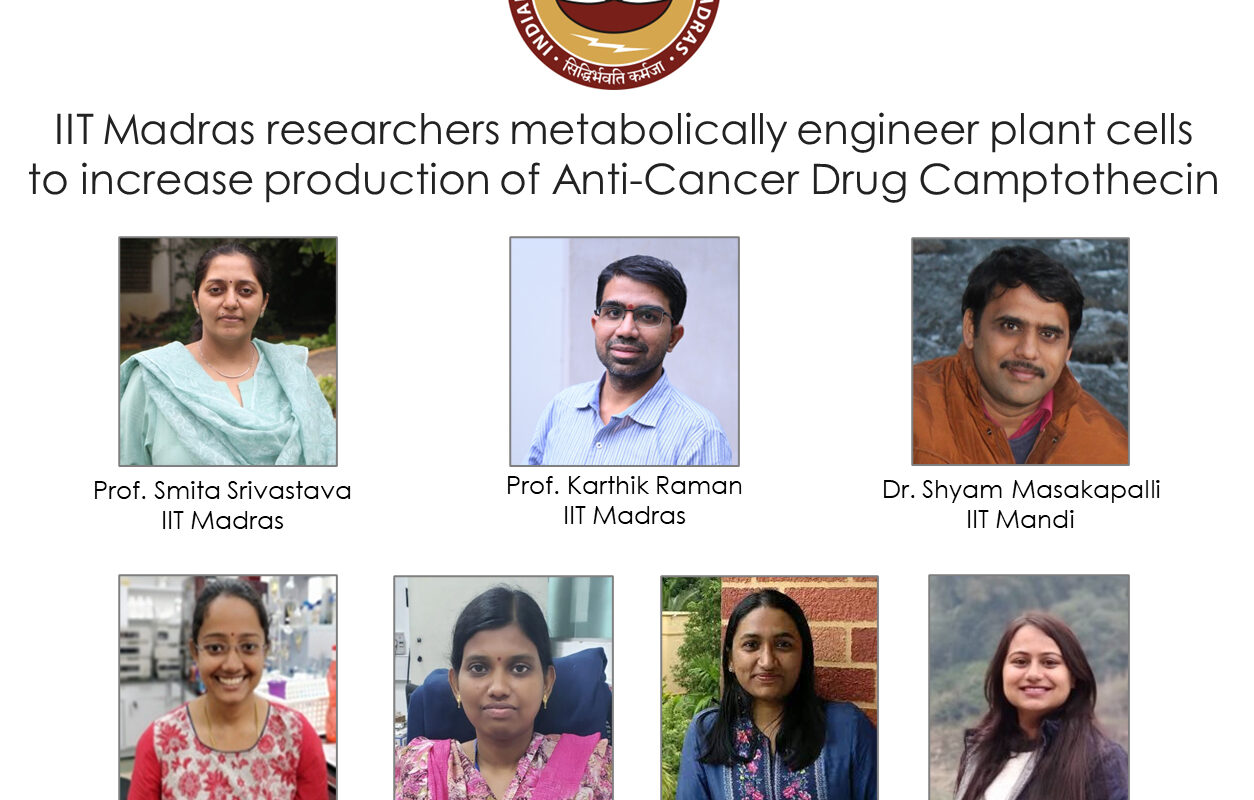- Home
- IIT Madras researchers metabolically engineer plant cells to increase production of Anti-Cancer Drug Camptothecin
IIT Madras researchers metabolically engineer plant cells to increase production of Anti-Cancer Drug Camptothecin

by Prashant Kapadia/NHN
This study can pave the way for effective and efficient commercial production of Camptothecin and other medicinally important alkaloids and reduce the need to cut down endangered plants
CHENNAI, 28th December 2023: Indian Institute of Technology Madras (IIT Madras) and IIT Mandi researchers have metabolically engineered the plant cells of Nothapodytes nimmoniana to increase the production of Camptothecin, which is used to treat cancer.
The researchers from the Plant Cell Technology Lab of IIT Madras have developed a genome-scale metabolic model for N. nimmoniana plant cells using Computational tools.
This can be a major boost to produce cancer-treating drugs as Camptothecin, the third most in-demand alkaloid, is commercially extracted in India from Nothapodytes nimmoniana, which is an endangered plant.
In a Research Paper published in 2021, IIT Madras researchers identified a microbe as a sustainable and high-yielding alternative source for the plant-derived anti-cancer drug Camptothecin. Nearly 1,000 tons of plant material is required to extract just one ton of Camptothecin.
Due to extensive overharvesting to meet the market demand its major plant sources are now red-listed as per IUCN. The N. nimmoniana population has seen more than a 20 per cent decline in the last decade alone.
In the current research, metabolic engineering of the plant cells using a genome-scale metabolic model was led by Ms. Sarayu Murali, PhD student, IIT Madras, Dr. Maziya Ibrahim, Computational Systems Biology Lab, IIT Madras, Prof. Karthik Raman and Prof. Smita Srivastava, Department of Biotechnology, IIT Madras, along with Dr. Shyam K. Masakapalli and Ms. Shagun Saini from Metabolic Systems Biology Lab, IIT Mandi.
The research was funded by the Science and Engineering Board (SERB) and the Department of Science and Technology (DST), Government of India. This study was recently published in the peer-reviewed Journal Frontiers of Plant Science (https://doi.org/10.3389/fpls.2023.1207218).
Highlighting the importance of this research, the Principal investigator of the project Prof. Smita Srivastava, Bhupat and Jyoti Mehta School of Biosciences, Department of Biotechnology, IIT Madras, said, “Integration of metabolic engineering with bioprocess engineering principles can ensure enhanced and sustainable production of Camptothecin, to continuously meet its increasing market demand in minimum time and cost in addition to natural resource conservation.”
Further, the Co-investigator of the study Prof. Karthik Raman, Bhupat and Jyoti Mehta School of Biosciences, Department of Biotechnology, IIT Madras, added, “This platform technology for model-based rational metabolic engineering of plant cells can be adapted to enhance the production of many other high-value phytochemicals as well. This study can pave the way for effective and efficient commercial production of camptothecin and other medicinally important monoterpene indole alkaloids, with reduced dependence on nature.”
Camptothecin (CPT) is an important anti-cancer drug lead molecule for high-value drugs like Topotecan and Irinotecan. It is a potent topoisomerase I inhibitor extracted mainly from – Camptotheca acuminata (native to Eastern Asia) and Nothapodytes nimmoniana (native to India). However, the conjunction of climate change and extensive deforestation undertaken for CPT extraction has pushed these plants into the endangered species category.
Elaborating on the technical aspects of this research, First Author of the Research Paper Ms. Sarayu Murali, PhD student, IIT Madras, said, “The metabolic model was reconstructed and curated using in house experimental data. Computational tools were then used to identify and rank suitable enzyme targets for overexpression and downregulation to maximize camptothecin production in N. nimmoniana plant cells. We experimentally validated the overexpression of an enzyme predicted by the model, which led to the development of a 5-fold high camptothecin-yielding cell line of N. nimmoniana in comparison to the untransformed plant cell line.”
Highlighting the impact this research could have in the field, Dr. Shyam Kumar Masakapalli, Associate Professor, School of Biosciences and Bioengineering, IIT Mandi, said, “The scientific strategies rationally adopted in this work paves way to further engineer plant cell bio-factories for sustainable biomanufacturing of high-value phytochemicals. It is satisfying to collaborate with the Plant Cell Technology Lab at IIT Madras, which has developed a potential platform for five-fold increased synthesis of camptothecin, a much-needed anti-cancer phytochemical.”
Cancer has been a leading cause of death worldwide, accounting to nearly 10 million deaths in 2020 according to the World Health Organization (WHO). In India, the number of cases is expected to rise to 15.7 lakh by 2025 according to the Indian Council of Medical Research-National Cancer Registry Programme (ICMR-NCRP 2020). With increasing cancer incidences each day, the demand for enhanced production of anti-cancer drugs has been a compelling need of the hour.
ABOUT IIT MADRAS : Indian Institute of Technology Madras (IITM) was established in 1959 by the Government of India as an ‘Institute of National Importance.’ The activities of the Institute in various fields of Science and Technology are carried out in 17 academic departments and several advanced interdisciplinary research academic centres. The Institute offers undergraduate and postgraduate programmes leading to B.Tech., M.Sc., M.B.A., M.Tech., M.S., and Ph.D., degrees in a variety of specialisations. IITM is a residential institute with more than 600 faculty and 9,500 students. Students from 18 countries are enrolled here. IITM fosters an active entrepreneurial culture with strong curricular support and through the IITM Incubation Cell.
Recognized as an Institution of Eminence (IoE) in 2019, IITM has been ranked No.1 in the ‘Overall’ Category for the fifth consecutive year in India Ranking 2023 released by National Institutional Ranking Framework, Ministry of Education, Govt. of India. The Institute has also been ranked No.1 in the ‘Engineering Institutions’ category in the same Rankings for eight consecutive years – from 2016 to 2023. It was also adjudged as the ‘Top innovative Institution’ in the country in Atal Ranking of Institutions on Innovation Achievements (ARIIA) in 2019, 2020 and 2021. ARIIA Ranking was launched by the Innovation Cell of Ministry of Education.

